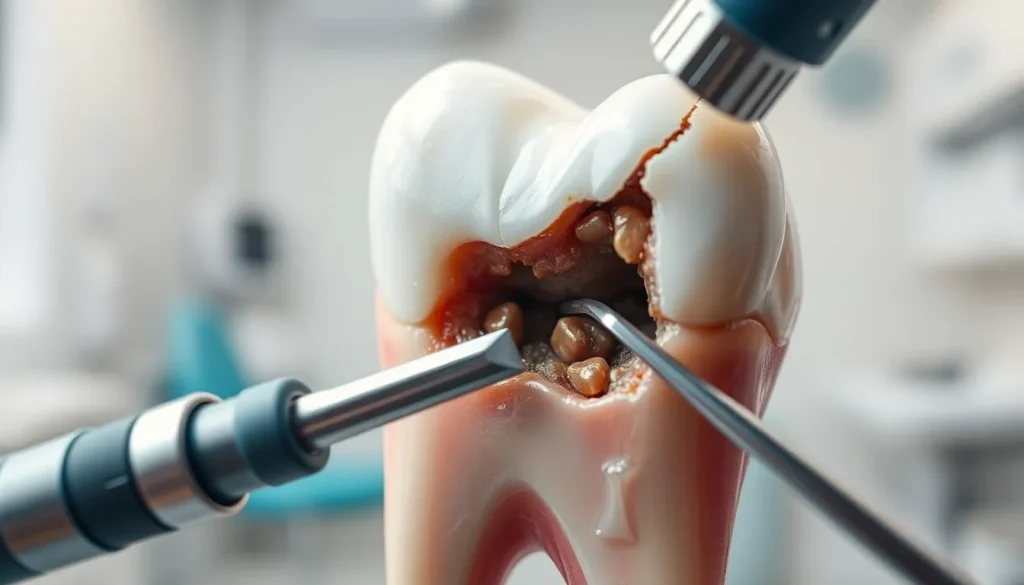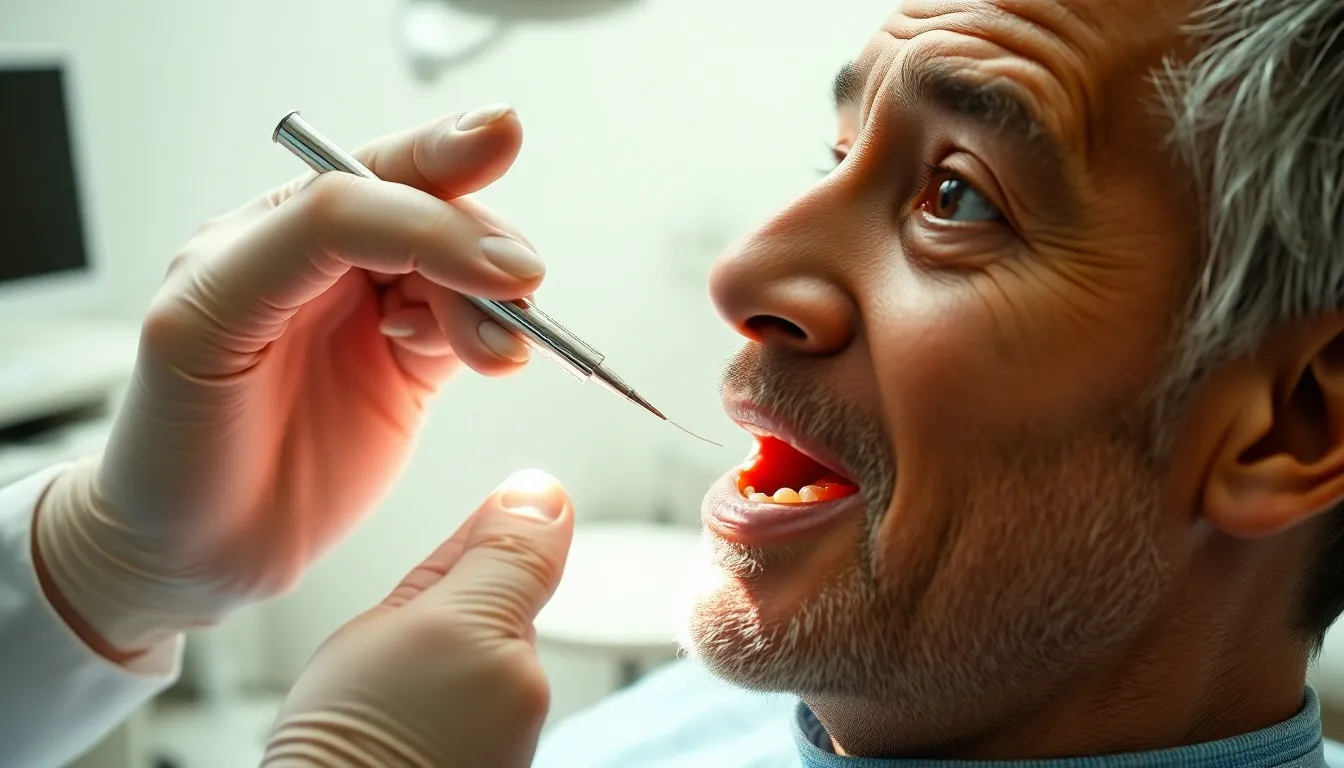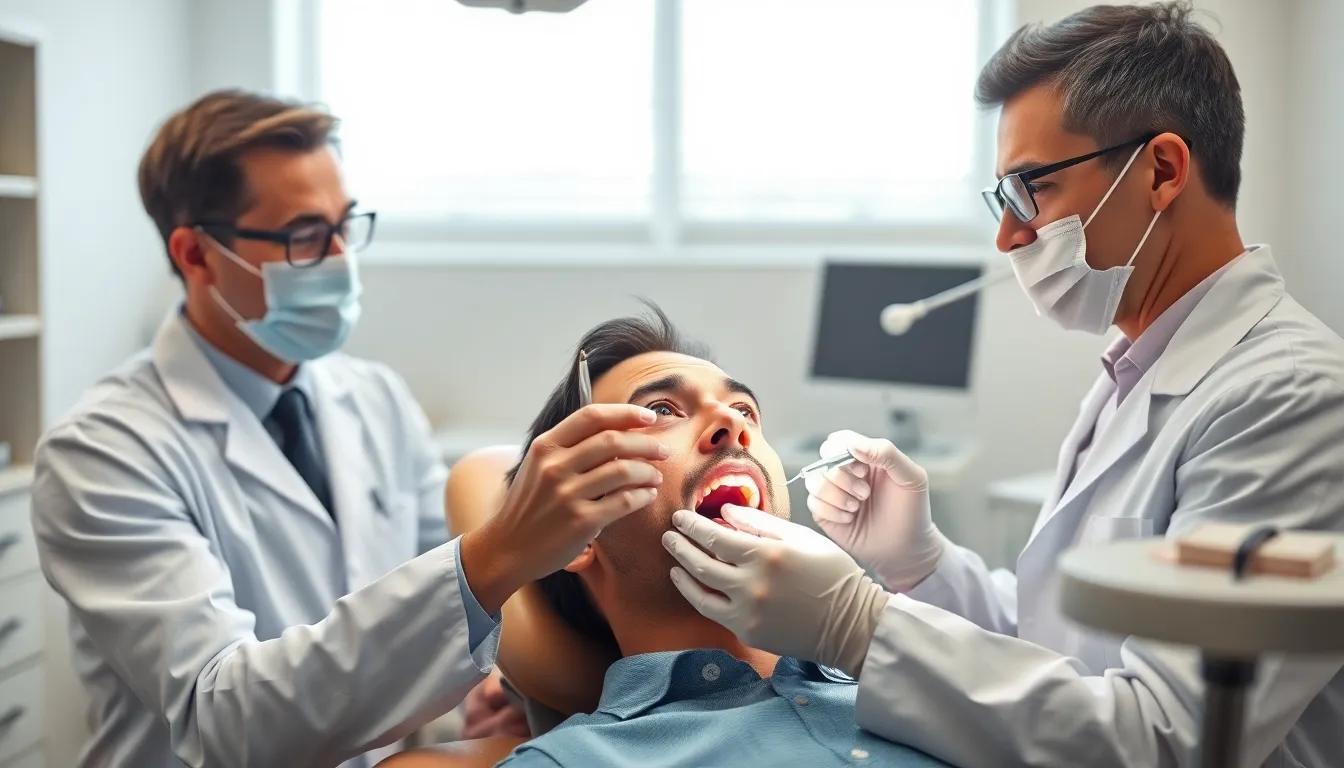Have you noticed that your broken tooth smells like poop? This unpleasant odor isn’t something you should ignore—it’s your body sending a clear warning signal about potential dental problems.
When a tooth breaks, it can create the perfect environment for bacteria to thrive. These bacteria break down food particles and produce sulfur compounds that smell remarkably similar to feces. This distinctive odor often indicates infection, decay, or an abscess that requires immediate attention. Without proper treatment, the condition can worsen, leading to more serious oral health complications and increasingly foul odors.
Understanding Foul Odors from Broken Teeth
When your broken tooth smells like feces, it’s not just an unpleasant experience—it’s your body signaling a serious dental problem. Broken teeth create perfect hiding spots for bacteria that thrive in the warm, moist environment of your mouth. These microorganisms produce volatile sulfur compounds (VSCs) as they break down proteins, resulting in that distinctive foul odor.
Dental infections commonly cause these putrid smells. Bacteria infiltrate the pulp chamber through cracks or fractures, attacking the living tissue inside your tooth. As this infection progresses, pus forms and emits sulfurous gases similar to the compounds found in fecal matter.
Dr. Todd B. Harris recalls a patient who initially dismissed her broken molar’s odor: “She thought using stronger mouthwash would solve the problem, but by the time she came in, the infection had spread to her jaw. The characteristic smell was unmistakable—a clear sign of anaerobic bacterial activity that required immediate intervention.”
Food particles trapped in broken teeth contribute significantly to malodor. These particles decompose over time, creating ideal conditions for bacterial proliferation. The combination of decaying food and bacterial waste products generates hydrogen sulfide and methyl mercaptan—the same compounds responsible for the smell of rotten eggs and feces.
Dental abscesses form when infections remain untreated, creating pockets of pus that smell particularly foul. This concentrated collection of bacteria, white blood cells, and dead tissue produces an intensely unpleasant odor that’s often described as similar to fecal matter.
Why a Broken Tooth Might Smell Like Poop
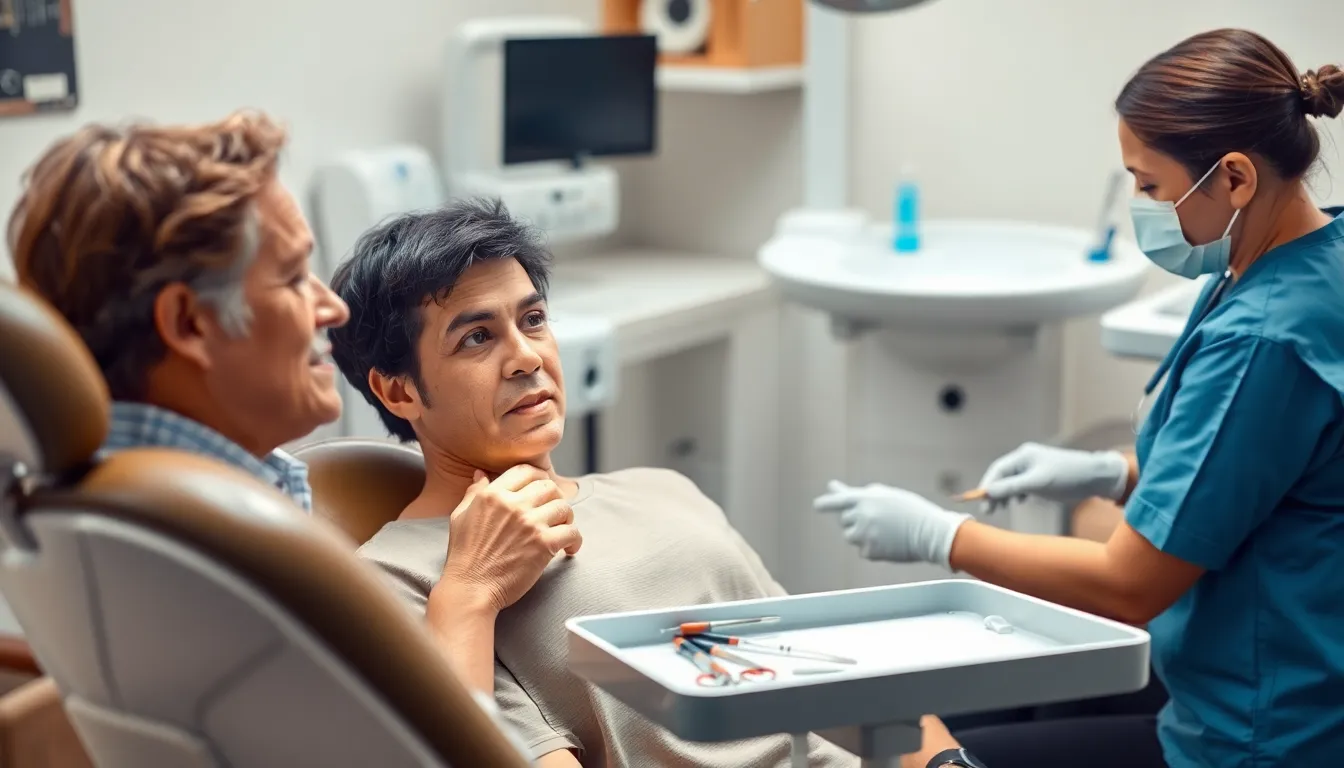
A broken tooth emitting a fecal-like odor typically indicates serious dental issues requiring immediate attention. This unpleasant smell stems primarily from two key factors: bacterial infection and decay, and trapped food particles.
Bacterial Infection and Decay
Bacterial infection creates the distinctive foul odor resembling feces when a tooth breaks. Crevices formed in the damaged tooth become perfect breeding grounds for anaerobic bacteria such as Porphyromonas gingivalis, Treponema denticola, and Fusobacterium nucleatum. These microorganisms thrive in oxygen-poor environments inside your broken tooth. As they metabolize dead tissue, they produce sulfur compounds and butyric acid that smell remarkably similar to fecal matter. The infection often intensifies as decay progresses deeper into the tooth structure, reaching nerves and blood vessels, which dramatically increases the potency of the malodor.
Dr. Todd B. Harris notes, “I’ve treated many patients who were embarrassed about their breath only to discover a broken tooth harboring important infection. Many don’t realize that a tooth can smell terrible even when it’s not causing pain, which makes regular dental checkups crucial for catching these issues early.”
Trapped Food Particles
Food debris caught in the cracks of your broken tooth contributes significantly to the poop-like smell. The fractures and holes in damaged teeth easily trap food particles, especially carbohydrates, creating an ideal environment for bacterial fermentation. This fermentation process produces volatile sulfur compounds and various acids that contribute to the putrid odor. Accumulated debris from your tongue, saliva, and inflammation fluids further exacerbate this microbial activity, intensifying the fecal smell.
A patient recently shared, “I couldn’t understand why my colleagues were keeping their distance until my dentist discovered a broken molar with trapped food that had been decomposing for weeks. The relief after having it cleaned and repaired was immediate—both for me and everyone around me!”
The combination of bacterial action on trapped food creates a perfect storm of malodorous compounds. Even if your broken tooth isn’t causing pain, the presence of this distinctive smell often indicates an abscess or infection that requires professional dental treatment to remove the infection source, clean out trapped debris, and restore the tooth to prevent further bacterial proliferation.
The Science Behind Dental Malodor
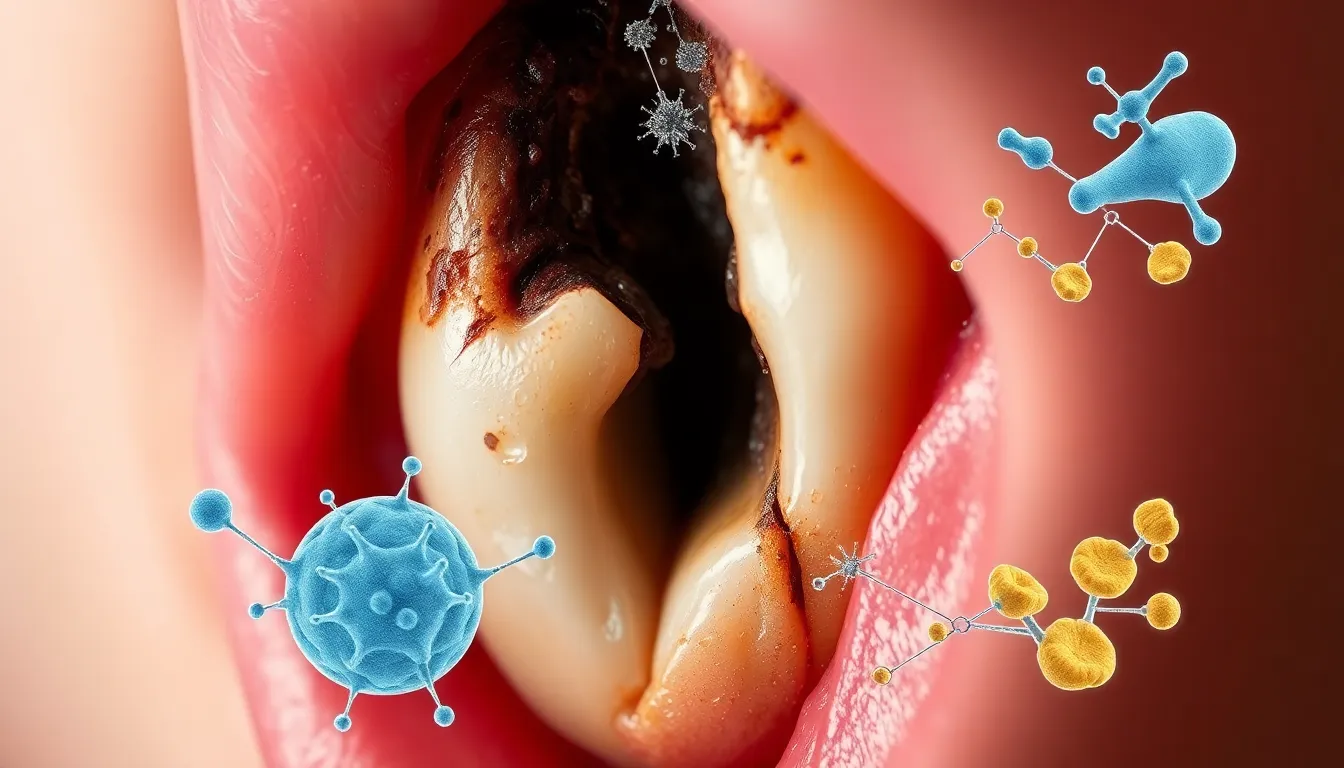
Dental malodor from a broken tooth stems from complex biological processes occurring within the damaged tooth structure. These processes create distinctive odors that many patients describe as similar to fecal matter due to exact chemical compounds produced by bacterial activity.
Volatile Sulfur Compounds
Volatile sulfur compounds (VSCs) constitute the primary culprits behind the poop-like smell emanating from a broken tooth. These compounds include hydrogen sulfide, methyl mercaptan, and dimethyl sulfide, all produced when sulfate-reducing bacteria break down proteins in the decaying tooth tissue. Dr. Todd B. Harris notes, “I’ve had patients who were completely unaware their broken tooth was causing their persistent bad breath until we identified these sulfur compounds as the source.” The chemical structure of VSCs closely resembles the compounds responsible for the smell of rotten eggs and fecal matter, explaining why patients often make this unpleasant comparison. These gases easily become airborne at room temperature, allowing them to travel through the air and create noticeable breath odor even when the broken tooth isn’t visible.
Anaerobic Bacteria
Anaerobic bacteria thrive in the oxygen-deprived environment created by a broken tooth. These microorganisms flourish deep within dental cavities and pulp chambers where oxygen levels are minimal. Once established, they metabolize proteins and sulfur-containing amino acids found in decomposing tooth tissue and trapped food particles. A memorable case involved a patient who complained of “a constant taste of sewage” even though rigorous oral hygiene—investigation revealed a fractured molar harboring a colony of anaerobic bacteria producing butyric acid, the same compound found in human waste. These bacteria play a crucial role in the production of VSCs and contribute significantly to the distinctive malodor associated with broken teeth. Their metabolic processes accelerate as the infection progresses, intensifying both the smell and potential damage to surrounding tissues.
Health Risks Associated with Foul-Smelling Broken Teeth
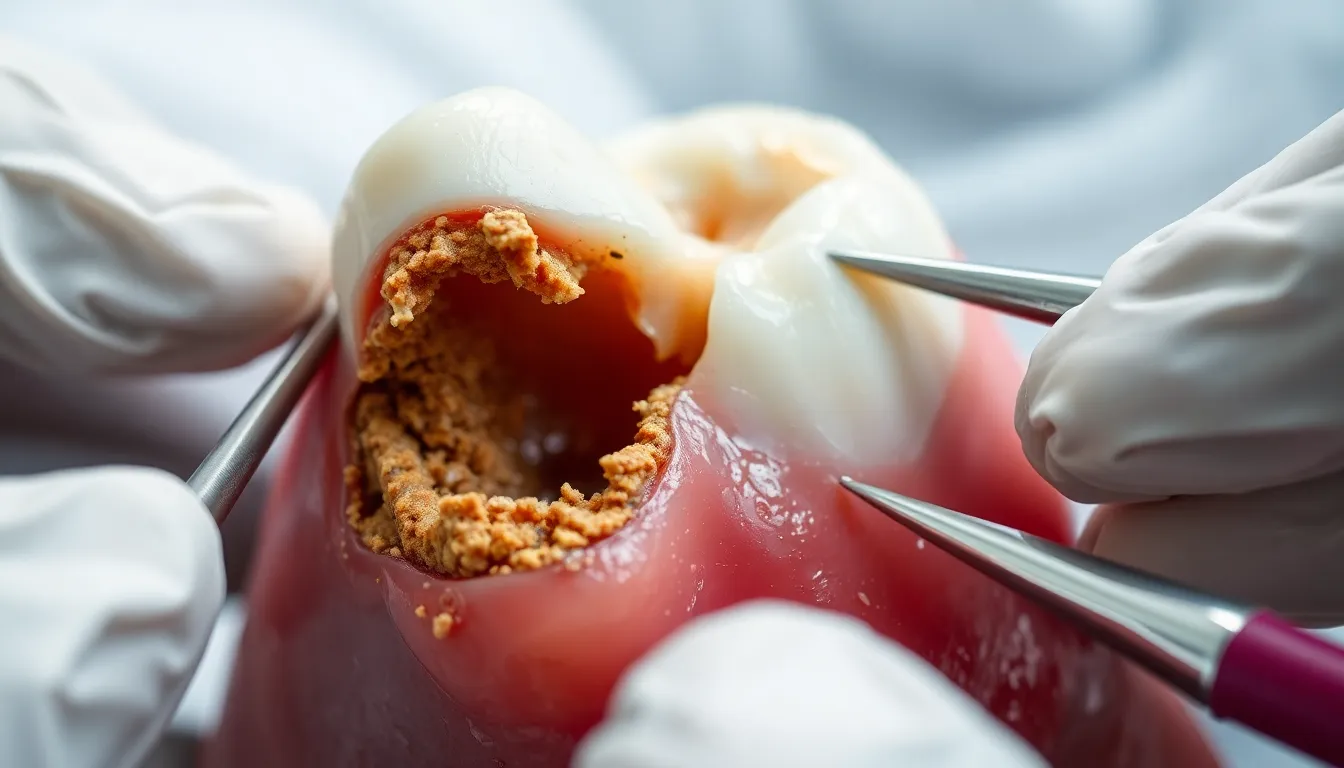
A broken tooth that smells like poop isn’t just unpleasant—it’s your body’s alarm system warning of serious dental issues. The foul odor indicates important bacterial accumulation that poses several health risks beyond just bad breath.
Bacterial Growth and Bad Breath
Broken teeth create perfect hiding spots for bacteria to colonize. These microorganisms feast on trapped food particles, producing volatile sulfur compounds (VSCs) responsible for the distinctive fecal-like smell. Your broken tooth’s rough surfaces and crevices harbor these bacteria where toothbrushes can’t reach, leading to persistent bad breath that won’t disappear with regular brushing or mouthwash. Dr. Todd B. Harris often tells patients, “That stubborn odor is nature’s way of telling you something’s seriously wrong beneath the surface.”
Potential for Abscess Formation
Broken teeth provide bacteria direct access to your tooth’s inner pulp. Once bacteria invade this sensitive area, they trigger infections that can develop into painful abscesses—pockets of pus that form at the tooth’s root. These abscesses emit particularly foul odors due to the concentration of bacteria and decaying tissue. The infection creates swelling, intense pain, and inflammation that can radiate throughout your jaw and face. Left untreated, abscesses destroy surrounding tissues and create chronic sources of bad breath.
One patient described her experience: “I ignored my chipped molar for weeks because it didn’t hurt. When the pain finally hit and my breath smelled terrible, the infection had already formed an abscess. My dentist explained I was lucky to catch it before it spread further.”
Systemic Health Concerns
The dangers of an infected broken tooth extend far beyond your mouth. Bacteria from dental infections can enter your bloodstream, potentially affecting vital organs throughout your body. This bacterial spread poses serious risks, especially for individuals with compromised immune systems or existing health conditions. Untreated infections may contribute to complications including:
- Heart inflammation (endocarditis)
- Respiratory infections
- Diabetic complications
- Brain abscesses in severe cases
Beyond physical health, the social impact of persistent foul breath affects your quality of life. Many patients report withdrawing from social interactions, experiencing anxiety in close conversations, and even developing nutritional deficiencies from avoiding certain foods due to pain while eating.
The combination of pain, infection, and embarrassing odor often leads to psychological distress that compounds the physical symptoms. Addressing a broken tooth promptly isn’t just about eliminating bad breath—it’s about protecting your overall health and wellbeing from potentially serious complications.
Treatment Options for Smelly Broken Teeth
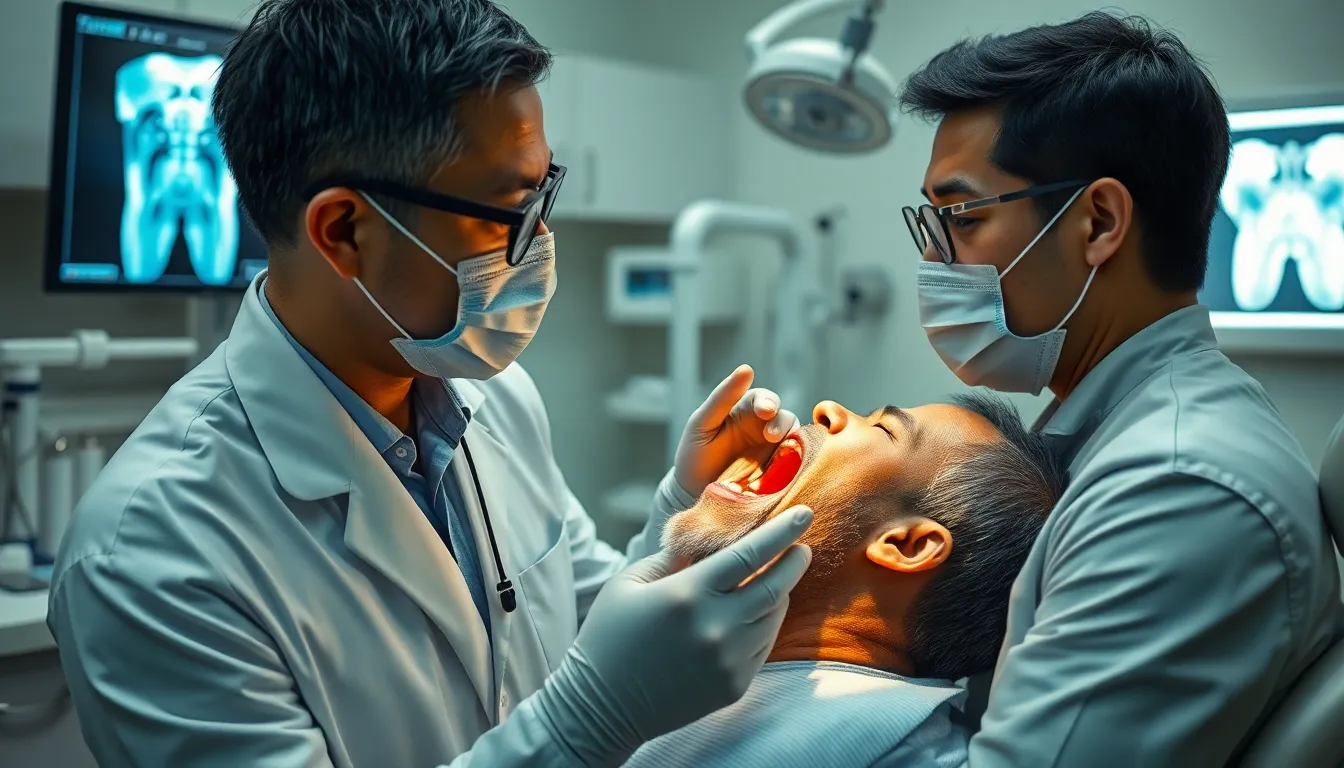
Treatment for a broken tooth with a foul odor requires prompt professional attention to address the underlying infection causing the smell. Dental professionals offer several effective answers to eliminate both the infection and the associated unpleasant odor.
Emergency Dental Care
Emergency dental treatment forms the first line of defense against a smelly broken tooth. Your dentist will conduct a thorough examination, often including X-rays, to determine the extent of decay or infection inside the tooth structure. Temperature and pressure tests help identify whether an abscess has formed or if the pulp tissue has sustained damage. Many patients attempt to mask the odor with temporary answers like chewing parsley or mint, but these methods don’t address the root cause of the problem. Dr. Todd B. Harris recalls a patient who delayed treatment for weeks while using mouthwash to cover the smell, only to require a more extensive procedure when they finally sought care due to the progression of the infection.
Antibiotics and Pain Management
Antibiotics play a crucial role in controlling bacterial infections associated with smelly broken teeth. Your dentist may prescribe an antibiotic course to reduce infection before performing definitive treatment. Taking antibiotics should only occur after proper dental diagnosis to prevent antibiotic resistance. Over-the-counter pain relievers often provide temporary relief from the discomfort while awaiting treatment. Most dental professionals recommend a combination approach—antibiotics to fight the infection and pain management to address symptoms until the tooth can be properly treated. Antibiotics alone won’t resolve the underlying issue, as they can’t reach bacteria sealed inside a dead or damaged tooth structure without physical intervention from a dental professional.
Prevention and Oral Hygiene Best Practices
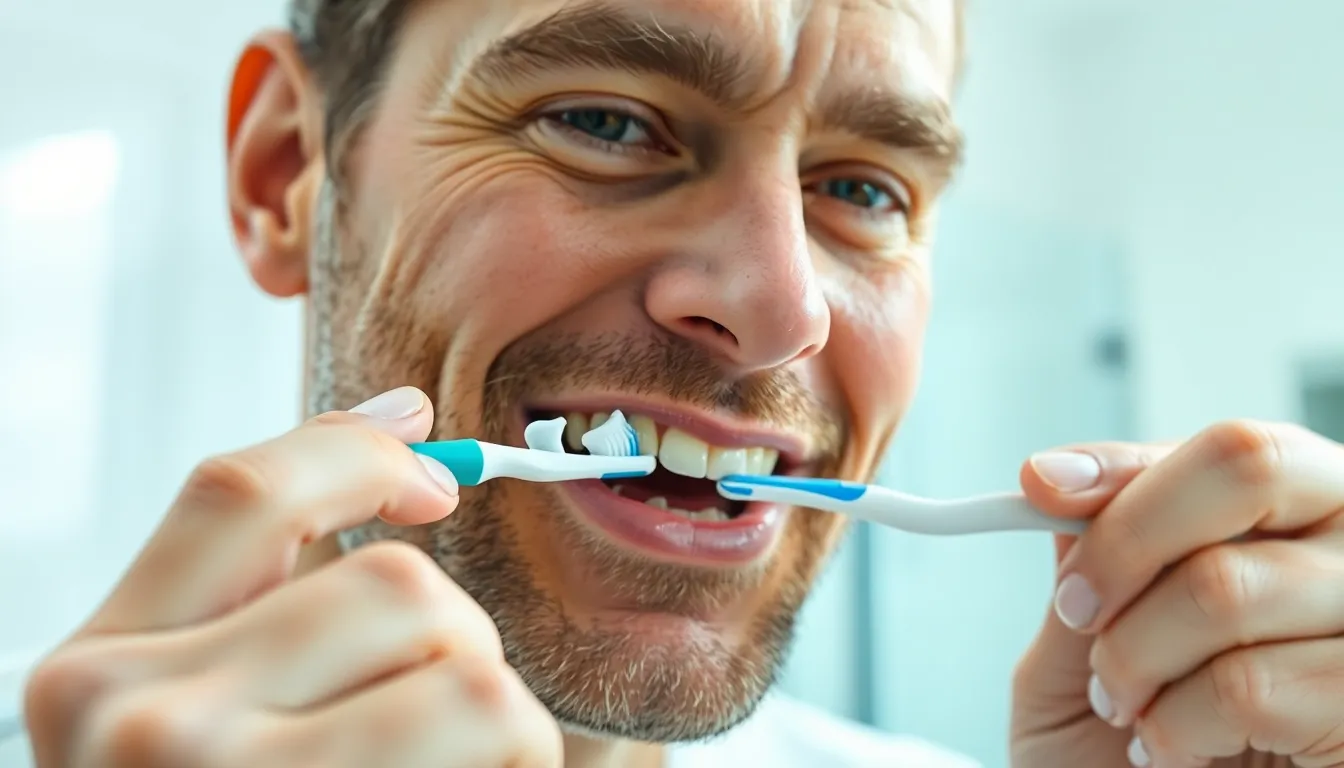
Maintaining rigorous oral hygiene prevents bad odors and complications from a broken tooth. Proper care not only minimizes the risk of infection but also reduces the chances of experiencing that fecal-like smell. Daily brushing around the broken tooth with fluoride toothpaste removes plaque and food particles that feed odor-causing bacteria.
Careful flossing reaches areas between teeth where debris commonly gets trapped, especially around broken tooth surfaces. Antibacterial mouthwash significantly reduces bacterial populations when used regularly after brushing and flossing, helping to freshen breath temporarily while you seek professional care.
Your diet plays a crucial role in preventing worsening odors from a broken tooth. Avoiding sugary and sticky foods limits bacterial growth that contributes to decay and foul smells. Consuming crunchy vegetables and fruits naturally cleans teeth surfaces and stimulates saliva production, which helps neutralize acids and wash away food particles.
Dr. Todd B. Harris recalls treating a patient who ignored her broken molar for months: “By the time she came in, the infection had progressed significantly, creating an unmistakable odor. After proper treatment and implementing a strict oral hygiene routine, she was amazed at how quickly the smell disappeared. This case demonstrates why immediate attention to broken teeth is so essential.”
Regular dental check-ups remain the most effective prevention strategy against broken teeth developing infections and odors. Professional cleaning removes hardened plaque that home care might miss, while early intervention prevents minor issues from developing into severe, odor-producing infections. Dentists can identify potential problems before they create conditions where bacteria thrive and produce sulfur compounds.
Prompt professional treatment of any broken tooth through fillings, root canals, or extraction when necessary eliminates the source of the odor and prevents further complications. Temporary dental cement from pharmacies can cover exposed areas until your dental appointment, reducing debris accumulation and bacterial infiltration.
Conclusion
A fecal odor from your broken tooth is your body’s urgent warning signal. This smell indicates dangerous bacterial activity producing sulfur compounds that mirror the scent of feces.
Don’t ignore this symptom even if you’re not experiencing pain. The bacteria thriving in your damaged tooth can lead to serious infections affecting not just your oral health but potentially your entire body.
Seek professional dental care immediately rather than masking the smell with temporary answers. Only a dentist can properly diagnose and treat the underlying infection causing this distinctive odor.
Remember that prevention through regular dental checkups is your best defense against developing these issues in the first place. Your prompt action now can save you from more complex health problems later.
Frequently Asked Questions
Why does my broken tooth smell like feces?
A broken tooth can smell like feces because it harbors bacteria that produce volatile sulfur compounds (VSCs) and butyric acid. These bacteria thrive in the oxygen-deprived environment of a cracked tooth, metabolizing proteins and creating sulfurous gases similar to those found in fecal matter. The smell intensifies as the infection progresses and more tissue decays.
Can a broken tooth cause bad breath even if it doesn’t hurt?
Yes, a broken tooth can cause persistent bad breath even without pain. Bacteria can colonize the crack or fracture, producing foul-smelling compounds as they break down trapped food particles and dental tissues. Many people don’t realize their broken tooth is causing their bad breath because pain might not develop until the infection reaches the nerve.
How urgent is it to see a dentist for a smelly broken tooth?
It’s extremely urgent. A foul-smelling broken tooth indicates active infection that requires immediate professional attention. Left untreated, the infection can worsen, leading to abscess formation, severe pain, and potential spread to other parts of your body. The stronger the odor, the more advanced the infection likely is.
Will brushing and mouthwash eliminate the smell from a broken tooth?
No, regular brushing and mouthwash cannot eliminate the smell from a broken tooth. While these hygiene practices may temporarily mask the odor, they cannot reach bacteria deep within the fracture or treat the underlying infection. Only professional dental treatment can address the root cause of the smell.
Can a smelly broken tooth affect my overall health?
Absolutely. The infection causing the odor can spread beyond your tooth to surrounding tissues, jawbone, and even enter your bloodstream. This can lead to serious health complications including heart inflammation (endocarditis), respiratory infections, and systemic infection. The bacterial toxins released can affect your immune system and overall well-being.
How will a dentist treat my smelly broken tooth?
Treatment depends on the extent of damage but typically includes cleaning the infected area, prescribing antibiotics to control the infection, and performing either a filling, crown, root canal, or extraction. The dentist will first conduct a thorough examination with X-rays to determine the best approach to eliminate the infection and restore the tooth’s function.
Why do broken teeth trap food particles?
Broken teeth create irregular surfaces, crevices, and openings where food particles can become lodged. Unlike intact teeth with smooth surfaces that allow food to slide off, fractured teeth have rough edges and pockets that trap food debris. These trapped particles decompose over time, feeding bacteria and contributing to the foul odor.
How long does it take for a broken tooth to start smelling?
A broken tooth can start developing an odor within days of the fracture as bacteria colonize the area and begin breaking down trapped food and damaged tissue. The timeline varies depending on oral hygiene, the severity of the break, and individual factors. However, noticeable malodor typically develops within 1-2 weeks of the tooth breaking.
Can antibiotics alone fix a smelly broken tooth?
No, antibiotics alone cannot fix a smelly broken tooth. While antibiotics help control the bacterial infection temporarily, they don’t address the structural damage or remove the source of infection. Professional dental treatment is necessary to repair or extract the tooth and eliminate the breeding ground for odor-causing bacteria.
How can I prevent my broken tooth from smelling while waiting for a dental appointment?
While waiting for your appointment, rinse with salt water several times daily to reduce bacteria, avoid sugary foods and beverages, brush gently around the area, use sugar-free gum to stimulate saliva production, and take over-the-counter pain relievers if needed. Remember these are temporary measures only – you still need professional treatment as soon as possible.

